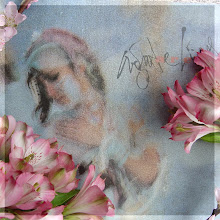 ◎
◎在 這 樣 一 個 夜 晚..In Such A Night Like This
_________________________________________
.
在這樣一個夜晚
風輕吻樹梢
不多發出一點聲音
萬物都已睡著
沒有白日的嘆息
陪伴於夜
他遙遠如月下
孤獨的帳篷
開敞沙漠中
最遙遠 .獨自閃爍的一顆星
可曾意識
彼端交熾的戰火
烈焰不止 .砲聲打亮夜如日
苟延迄今
流血至此
他不多話
酣聲很柔
在這樣一個
風輕吻樹梢
萬物都已熟睡的夜
.
transcript from post-memory, first written in 1992
©2009 . 進 洪
.
 十二之卷 (
十二之卷 ( 桔梗 Platycodon grandiflorus
* Haworthia, for Adrian Hardy Haworth (19 Apr. 1765- 24 Aug. 1833), English plantsman amateur botanist and etomologist, author of books on succulent plants, bulbs, butterflies and moths.
 黃金柏 Cupressus* macrocarpa 'Goldcrest', Crossandra* infundibuliformis, '粉團' 朱槿 Hibiscus* rosa-sinensis 'Crested', Rosa 'Bianca'
黃金柏 Cupressus* macrocarpa 'Goldcrest', Crossandra* infundibuliformis, '粉團' 朱槿 Hibiscus* rosa-sinensis 'Crested', Rosa 'Bianca'* Crossandra, from Greek krossoi, fringe, and aner, male, referring to the fringed stamens.
* Hibiscus, Greek name for mallow.
* Cupress, from Greek kuparissos, a word taken from an unknown near Eastern language, allied to the Hebrew gopher, the name of Cupressus sempervirens ( Mediterranean Cypress/ Graveyard Cypress/ Pencil Pine 原產地中海氣候區的 絲柏.)
The common name comes from Old French cipres and that from Latin cyparissus, which is the latinisation of the Greek κυπάρισσος, kypárissos.



1 則留言:
In Greek mythology, Cyparissus or Kyparissos (Greek: Κυπάρισσος, "cypress") was a boy beloved by Apollo. The favorite companion of Cyparissus was a tamed stag, which he accidentally killed with his hunting javelin as it lay sleeping in the woods. The boy's grief was such that it transformed him into a cypress tree, a classical symbol of mourning. The myth is thus aetiological in explaining the relation of the tree to its cultural significance. (wiki)
張貼留言